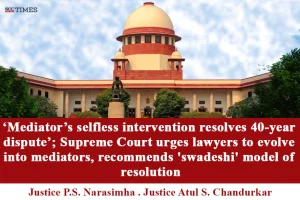Supreme Court: In a 40-year-old civil dispute, a Division Bench of P.S. Narasimha and Atul S. Chandurkar, JJ, commended a Court-appointed mediator for successfully resolving the matter. The Court observed that the essence of dispute resolution rested in selfless endeavour, the foundation of harmonious living. It held that exactly that had occurred, the mediator set aside the argumentative skills and adversarial demeanour associated with a lawyer and personally travelled to Hamirpur to mediate between the parties.
The Court explained that the model of mediation they envisioned for the country, termed swadeshi mediation, had transcended the binary often embedded in Western approaches (which separate professionalism from individual character). It stated that goodness was an essential value not something divorced from professionalism, nor unattainable through the power of the will.
Background
A protracted litigation lasting nearly four decades came up before the Court. Notice in the case had been issued in November 2011, but no final resolution had occurred. On 23-10-2024, during hearing , the Court requested Senior Advocate Gaurav Agrawal to mediate between the parties.
Mr. Gaurav Agrawal, appointed as the mediator by the Court, undertook extensive efforts. He travelled to Hamirpur (Himachal Pradesh), met with the rival family members, jointly inspected the land and properties in the village, and engaged in dialogue with all concerned. The mediator succeeded in facilitating a settlement acceptable to both sides.
When the mediation report was placed before the Court, the appellant acknowledged that he never expected an advocate to transcend his adversarial role so significantly, and he expressed gratitude for the mediator’s efforts. The respondent, also joined in appreciation, reporting that though there had been initial disagreement, his client had ultimately accepted the mediator’s suggestions and requested that the appeal be disposed in terms of the agreement.
Analysis and Decision
The Court observed with satisfaction that younger members of the bar witnessed the efficacy of persuasion through mediation rather than adversarial litigation. It emphasised that the success of dispute resolution lies in selfless endeavour, and that advocates evolving into mediators must adopt a distinct skill set and mindset, listening over speaking, and prioritising harmony over confrontation. The Court referred to this approach as a model of “swadeshi mediation,” where professional excellence is aligned with personal integrity.
“If lawyers are to double-up and evolve as mediators, a development which we consider is inevitable; they must cultivate a distinct set of skills and adopt a new attitude towards dispute resolution, one that diverges from adversarial litigation.”
Given the settlement reached, the Court allowed both petitions and disposed of civil appeal. The Court issued specific directions in terms of the agreement:
-
The agricultural land was to be measured by the Patwari in presence of both parties.
-
The respondent, was given the option to choose 7 Kanals, 10 Marlas from the demarcated land, to be handed over to him by the appellant in the presence of the Patwari.
-
The house and cowshed in the “Abadi Area” were to be retained by Raksha Devi and her children. The shops, along with the land beneath and behind them, were to be retained by the appellant and her children.
The Court directed the Registry to draw a decree in terms of the settlement.
[Raksha Devi v. Parkash Chand, 2025 SCC OnLine SC 2238, decided on 24-09-2025]
Advocates who appeared in this case:
For Appellant(s): Mr. Akhil Sachar, Adv. M/S. Karanjawala & Co., AOR, Ms. Babita Rawat, Adv.
For Respondent(s): Mr. G. Arudhra Rao, Adv., Mr. Merusagar Samantaray, AOR

